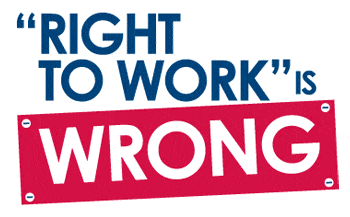
Who’s behind right-to-work?
Ignoring the facts about “right-to-work,” far-right politicians across the country are promoting these deceptive policies as payback to their Big Business donors. By weakening workers’ ability to have a say about their job, right to work weakens unions’ ability to serve as an advocate for all workers and a check against corporate greed.
Without solid evidence to back their claims, the politicians advancing right-to-work legislation depend on a coordinated network of extremist right-wing groups to provide resources, research, and an echo chamber that pave the way for right to work.
The most well-known of these cash-flush special interest groups include the American Legislative Exchange Council (ALEC), the U.S. Chamber of Commerce, and the National Right to Work Committee. Read on to learn more about the groups working overtime to make every state a right-to-work state.
ALEC
Right to work has gained some momentum as result of the collusion between Big Business and allied lawmakers involved in ALEC, an established conservative group backed by corporate special interests that peddles influence with state legislators. While much of its work has gone on behind closed doors, several media outlets and the Center for Media and Democracy have recently exposed how ALEC operates, peeling back the curtain on the significant political influence it wields at the state level. ALEC gives companies and politicians a shared role in developing its legislative prototypes, which are then introduced in copycat fashion by its members in legislatures nationwide. As part of its extremist agenda, ALEC and its members aim to limit the rights of workers and their unions through initiatives such as right to work. Check out Progress Missouri’s ALEC exposé, which reveals just how similar Missouri’s proposed right-to-work bill is to ALEC’s draft legislation.
In the ultimate irony, ALEC gives corporations a voice and a vote in order to rob workers of theirs. ALEC’s leadership and membership include executives from corporations like Comcast and Walmart that are notorious for their low-wage, anti-worker business practices. ALEC is also tied to heavy hitters in the Tea Party movement, like the billionaire Koch brothers, who channel their vast wealth to far-right groups and politicians and helped orchestrate Wisconsin Gov. Scott Walker’s repeal of public employees’ collective bargaining rights.
U.S. Chamber of Commerce
As the nation’s most powerful lobbying group, the U.S. Chamber of Commerce has made right to work one of its top priorities. The U.S. Chamber and its state affiliates have issued misleading reports, launched PR blitzes, and used their lobbying muscle to advance right-to-work legislation across the country. Like ALEC, corporations funnel money to the prominent lobbying force to promote their agenda in Congress and in the states. The U.S. Chamber has been campaigning against unions, fair labor practices, increases in the minimum wage, and legal protections for America’s workers for nearly a century.
While the Chamber advocates that workers benefiting from a union contract should not have to pay the union any fees, the Chamber does not appear to hold itself to the same standards. Click here to view a local Chamber’s double standard on right to work, which surfaced when the area’s union Building Trades Council inquired whether it would be possible to be a member of the Chamber but not pay dues. The Chamber responded that “It would be against Chamber by-laws and policy to consider any organization or business a member without dues being paid. The vast majority of the Chamber’s annual revenues come from member dues, and it would be unfair to the other members to allow an organization not paying dues to be included in member benefits.”
For more about the U.S. Chamber, click here.
National Right to Work
The National Right to Work Committee and its legal arm, the National Right to Work Legal Defense Foundation, are longtime proponents of right to work. The group claims to be a “worker advocate,” but an examination of its press releases issued between 2003 and 2005 showed no reference to any attempt to improve benefits or working conditions for workers; and only one mention of increasing wages. Meanwhile, the organization continuously pushes reports with outdated and flawed information to advance right to work. National Right to Work refuses to disclose its donors. However, like ALEC, the group has connections to the ultra-conservative Koch brothers.
For more about National Right to Work, click here.
What About Corporations?
In addition to hiding behind these special-interest groups, thanks to Supreme Court’s decision in Citizens United, corporations have significant leeway to funnel hundreds of millions of dollars to influence elections and policy—without having to disclose their role. Since that landmark decision, record sums of money have been spent by outside groups to scale back protections for workers, and it is no coincidence that right to work has recently gained momentum.
Despite the challenges of tracking specific businesses and donors that are involved in promoting right to work, it’s clear that those behind these efforts have deep pockets. In 2012, Indiana’s airwaves were flooded with ads for right to work featuring top Republican lawmakers, who refused to share how the ads were funded. Public records reveal that the Indiana Opportunity Fund, a group founded by Republican activist Jim Bopp, spent $600,000 on ad buys. With laws granting anonymity to his donors, Bopp wouldn’t disclose where the money came from.
Related News
- After FRA rule, Jared Cassity explains why we still need the Rail Safety Act
- ALERT for L.A.-area members — operator stabbing suspect at large
- SMART-TD wins SEPTA members’ security in their chosen craft
- Shining brightly in the midst of darkness
- Early-bird pricing for TD National Training Seminar ends April 30
- SMART-TD endorses U.S. Sen. Mike Braun (R-Indiana) as the next governor of the Hoosier State!
- FTA action on bus, transit safety plans praised by SMART-TD
- 27 transit members reinstated back to work in Montebello, California
- FRA crew-size rule came from our collective power
- SMART-TD, FRA announce federal regulation requiring two-person freight crews